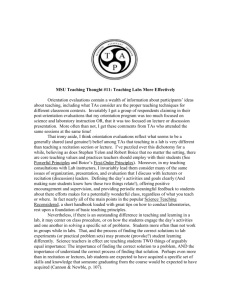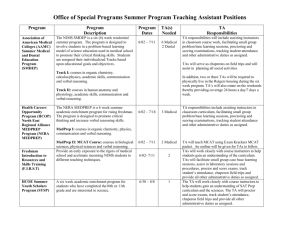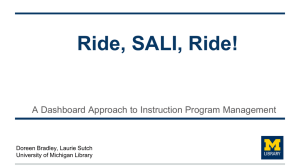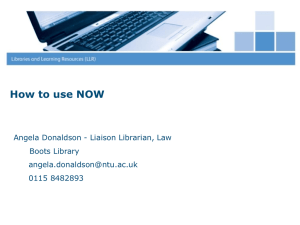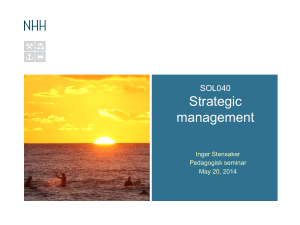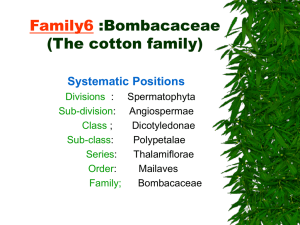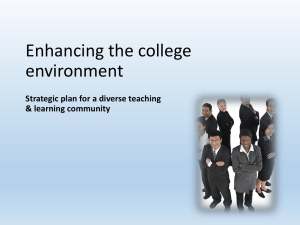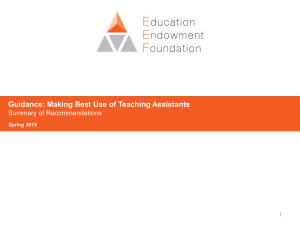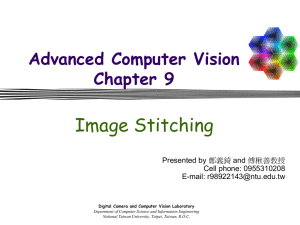CSIE1212: Data Structures and Algorithms 資料結構與演算法
advertisement
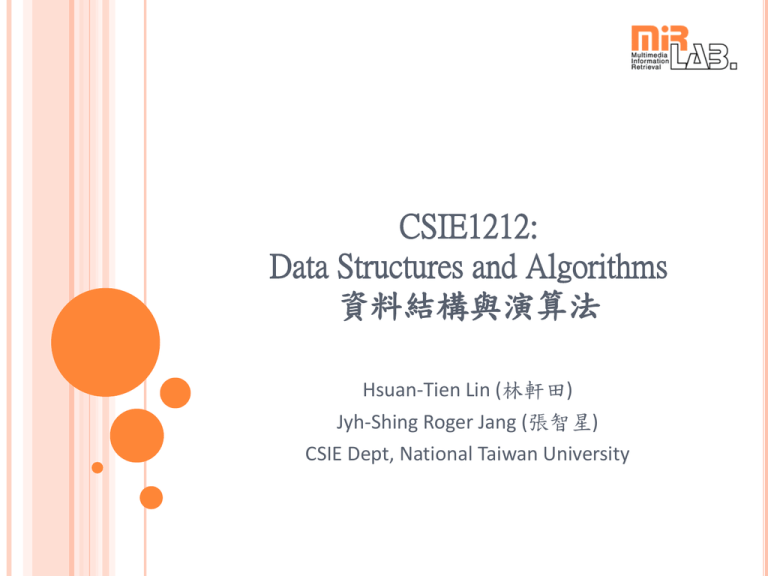
CSIE1212: Data Structures and Algorithms 資料結構與演算法 Hsuan-Tien Lin (林軒田) Jyh-Shing Roger Jang (張智星) CSIE Dept, National Taiwan University Warnings Before (Signing for) the Course (1/3) Goal of NTU DSA class As good as the best ones in the world Tentatively, 6 homework sets, midterm exam, final project About homework Including writing assignments and time-consuming programming assignments HW1 is to be announced next week Warning: High expectations Be prepared to work hard! 2 Warnings Before (Signing for) the Course (2/3) Will you give me a second chance if I copy homework from other people? No. Could you let me pass because I will be kicked out by the ½ rule? No. Will you change my score from F to C? No. Warning: Strict instructor Be prepared to follow the rules! 3 Warnings Before (Signing for) the Course (3/3) We are veterans HT: Fifth-time teach the course Roger: Fourth-time teach the course But we are ambitious and willing to experiment with different ways for effective learning. How many people will not pass? Not known yet. Will your investment get good return (knowledge)? No guarantees, but we’ll try our best. Warning: Uncertain outcome Be prepared to take some risks! 4 Wise Words 給資訊系的同學們:努力加油! 給想加選的外系同學們:審慎考慮! 5 Some Historical Notes Around 1997 「計程」有兩學期,上學期教 C,下學期教 C++ 大二上學期教「資料結構」 大二下學期教「演算法」 Starting 2001 「計程」變成一學期,大一下學期教「物件導向程式設計」 大二上學期教「資料結構與演算法上」 大二下學期教「資料結構與演算法下」 Starting 2010 物件導向程式設計變為選修 大一下學期教「資料結構與演算法」 大二上學期教「演算法設計與分析」 6 Reasons 兩學期的「計程」變成一學期、「物件導向程式設計」 變成選修:相信同學們可以有自己學習不同語言的能 力。 把「資料結構」及「演算法」合成一門課:兩者互相 依賴,其實不容易分散來教。 把「資料結構與演算法上/下」區分成「資料結構與演 算法」和「演算法設計與分析」:強調前者以實作為 主,銜接計程做更深入的程式練習;後者以分析為主, 建立在前者的基礎上以探討更多不同的演算法。 7 Course Descriptions Goal Use software to synergize two resources effectively Computation: CPU, GPU Storage: memory, disk, network A program is… Algorithms + Data Structures = Programs 8 About Instructors Instructors Hsuan-Tien Lin 林軒田 Email: htlin@csientu.edu.tw Office: 314 J.-S. Roger Jang 張智星 Email: jang@mirlab.org Skype: roger_jang Mobile: 0953-154-045 Office: 509 Office hours: After class or by appointments 9 Important Links Important links for DSA DSA on Facebook https://www.facebook.com/groups/1613087705581971 CEIBA (for mailing list, etc) HT: http://ceiba.ntu.edu.tw/1032dsa Roger: http://ceiba.ntu.edu.tw/1032dsaByRoger Course websites: HT: http://www.csie.ntu.edu.tw/~htlin/course/dsa15spring Roger: http://mirlab.org/jang/courses/dsa 10 Textbook and Prerequisites Textbook: Data Structures and Algorithms in C++, 2nd Edition by Goodrich, Tamassia and Mount. Please get it as early as possible since we have reading assignments Learning to read a text book is part of the course NTU Library: reserved copy in the shared course material area Prerequisites C: required C++: preferred 11 To Keep Two Classes Sync’ed To keep these two DSA classes equivalent (and make it fair), we will try to keep (almost) everything the same, including textbook, homework, midterm exam, final project, grading formula, TAs, schedule, etc. So what’s the difference? HT’s class is in English Roger’s class is in Mandarin So… You don’t need to switch between these two classes. You are welcome to attend any class at any time. 12 More about the Instructors Both instructors are strict but friendly, and willing to help... Will you repeat the previous code/slide? Yes! Will you discuss with me after class if I don’t understand? Yes! Will you pardon my silly questions? There is no silly questions at all! Feel free to ask the instructors and give feedbacks! 13 About Enrollment Both instructors welcome extra enrollment, up to the limit of the classroom. (Type-3) Auditing is also welcome. Think before you choose to enroll. If you have chosen to do so, welcome aboard! 14 About TAs List of TAs (tentatively): Graduate student: 黃冠豪 Undergraduates: 宋彥頡、林天翼、陳步青、鍾毓安、鍾詠先、 林于智、沈亮欣、劉承昌、周紀寧 Email for TAs: dsa@csie.ntu.edu.tw All the TAs and instructors will receive emails sent to this account. It is usually faster than sending to individual. Office hours for TAs: to be announced. Very friendly TAs. Be sure to ask them questions! 15 Policy of fairness How important is fairness? For monkeys Our ultimate policy of fairness Taking any unfair advantages over other class members is not allowed It is everyone’s responsibility to maximize the level of fairness. This applies to instructors, TAs, and students. No cheating! No lying! No plagiarism! 16 Grading Policy 10% for participation 2% each for in-class or on-forum (FB) questions/asnwering 90% Homework: 45% or so Midterm exam: 20% or so Final project: 25% or so The final grades are based on both scores and rankings The instructors reserve the rights to Adjust percentages of each categories Determine the way to combine scores and rankings 17 About Homework (1/2) Homework discussions are encouraged, but students should have their own write-ups alone and understand them fully. References (books, notes, Internet) can be consulted, but not copied from. Lending/borrowing homework is strictly prohibited! Deal? If your classmate wants to borrow homework from you, what do you say? 18 About Homework (2/2) No individual extension allowed unless for legitimate reasons notified in advance Overdue penalty for homework 90% discount for overdue of 0-12 hours 80% discount for overdue of 12-24 hours … Four penalty-free late half-days (金牌) per person. 19 Reading Assignments Weekly reading assignments Sections related to what we teach Sections that are worth reading by yourself 3/6: 3-hour teaching, 6-hour reading/writing after class Some of the reading material may show up in exams We cannot teach the whole book, but with reading you can learning it all. 20 How to Pass the Class? Golden rules to pass the class Catch up from day 1 Ask questions! Have fun (and spend hours) writing programs Understand theorems and proofs 21 Can and Cannot Rules in the classroom Eating? Fine, but no smells and no noise Sleeping? Fine, but no snoring Cellphone? Fine, but use silent mode and speak outside 22 Todo List Update your secondary email address on CEIBA Read the policy thoroughly Buy the textbook and read Chapter 1 Welcome aboard! Questions? 23
